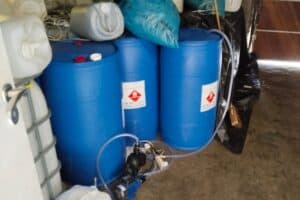The problems caused by foetal alcohol syndrome vary from child to child, but defects caused are not treatable or reversible.

There is no amount of alcohol that’s known to be safe to consume during pregnancy. If you drink during pregnancy, you place your baby at risk of foetal alcohol syndrome.
This is a condition in a child that results from alcohol exposure during the mother’s pregnancy. The syndrome causes brain damage and growth problems.
The problems caused by foetal alcohol syndrome vary from child to child, but defects caused are not treatable or reversible.
If you suspect your child has foetal alcohol syndrome, talk to your doctor as soon as possible. Early diagnosis may help reduce problems such as learning difficulties and behavioural issues.
If you’re pregnant and can’t stop drinking, ask your obstetrician, primary care doctor or mental health professional for help.
Early diagnosis may help reduce the risk of long-term problems for children with foetal alcohol syndrome.
Don’t wait for problems to arise before seeking help. However, if your child has problems with learning and behaviour, talk with his or her doctor so that the underlying cause might be identified.
The more you drink while pregnant, the greater the risk to your unborn baby. However, any amount of alcohol puts your baby at risk.
Your baby’s brain, heart and blood vessels begin to develop in the early weeks of pregnancy.
Impairment of facial features, the heart and other organs, including the bones, and the central nervous system may occur as a result of drinking alcohol during the first trimester.
That’s when these parts of the foetus are in key stages of development.
However, the risk is present at any time during pregnancy.
Symptoms
The signs and symptoms of foetal alcohol syndrome may include any mix of physical defects, intellectual or cognitive disabilities and problems functioning and coping with daily life.
Physical defects:
- Facial abnormalities, including small eyes, an exceptionally thin upper lip, a short, upturned nose, and a smooth skin surface between the nose and upper lip
- Deformities of joints, limbs and fingers
- Slow physical growth before and after birth
- Vision difficulties or hearing problems
- Small head circumference and brain size
- Heart defects and problems with kidneys and bones
Brain and central nervous system problems:
- Poor coordination or balance
- Intellectual disability, learning disorders and delayed development
- Poor memory
- Trouble with attention and with processing information
- Difficulty with reasoning and problem-solving
- Poor judgment skills
- Jitteriness or hyperactivity
- Rapidly changing moods
- Social and behavioural issues
Problems with interaction and functioning in society:
- Difficulty in school
- Poor social skills
- Trouble adapting to change
- Problems with behaviour and impulse control
- Poor concept of time
- Problems staying on task
- Difficulty planning or working toward a goal
Causes
- Alcohol enters your bloodstream and reaches your developing foetus by crossing the placenta. Alcohol causes higher blood alcohol concentrations in your developing baby than in your body because a foetus metabolises alcohol slower than an adult does.
- Alcohol interferes with the delivery of oxygen and optimal nutrition to your baby.
- Exposure to alcohol before birth can harm the development of tissues and organs and cause permanent brain damage.
Complications
Secondary disabilities from foetal alcohol syndrome may include:
- Attention deficit/hyperactivity disorder
- Aggression, inappropriate social conduct, and breaking rules and laws
- Alcohol or drug misuse
- Mental health disorders
- Problems staying in school
- Problems with independent living and with employment
- Inappropriate sexual behaviours
- Early death by accident, homicide or suicide
Diagnosis
To make a diagnosis, your doctor:
Discusses drinking during pregnancy – The timing and amount of alcohol you consume can help the doctor determine the risk of foetal alcohol syndrome.
Even though it cannot be diagnosed before a baby is born, they can assess the health of the mother and baby during pregnancy.
Watches for signs and symptoms of foetal alcohol syndrome in your child’s initial weeks, months and years of life – This includes assessing physical appearance and distinguishing features of your baby and monitoring your child’s physical and brain growth and development.
Assesses cognitive ability and learning and language development difficulties – Many features seen with foetal alcohol syndrome may also occur in children with other disorders.
If foetal alcohol syndrome is suspected, your paediatrician may refer your child to a developmental paediatrician, a neurologist or another expert with special training in foetal alcohol syndrome for evaluation and to rule out other disorders with similar signs and symptoms.
Treatment
There’s no cure or specific treatment for foetal alcohol syndrome.
The physical defects and mental deficiencies typically persist for a lifetime. However, early intervention services may help reduce some of the effects of foetal alcohol syndrome and may prevent some secondary disabilities.
Intervention services may involve:
- A team that includes a special education teacher, a speech therapist, physical and occupational therapists, and a psychologist
- Early intervention to help with walking, talking and social skills
- Special services in school to help with learning and behavioural issues
- Medications to help with some symptoms
- Medical care for health problems, such as vision problems or heart abnormalities
- Addressing alcohol and other substance use problems
- Vocational and life skills training
- Counselling to benefit parents and the family in dealing with a child’s behavioural problems
- Treatment for problems with alcohol






